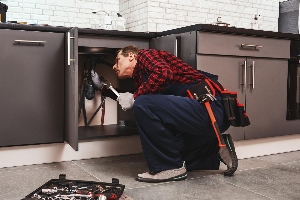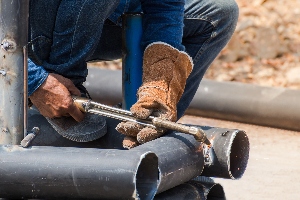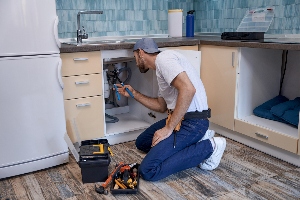Installing a whole house water filter can significantly enhance your water quality, providing peace of mind for you and your family. The primary benefit of a whole house water filter is its ability to effectively remove contaminants, ensuring that every tap in your home delivers clean, safe water. By investing in a reliable filtration system, you can protect your household from harmful substances commonly found in municipal water supplies.
At One Call Plumbing, our plumbers in Spartanburg and Greenville provide Whole House Water Filter services that ensure pure, clean water from every tap. We install top-of-the-line filtration systems that remove contaminants, improve taste, and protect against plumbing corrosion, enhancing your water quality and overall health.
How Whole House Water Filters Work
Whole house water filters are installed at the point where water enters your home. This setup ensures that every drop of water is treated before it reaches your faucets, showerheads, and appliances.
Typically, these systems consist of multiple layers of filtration.
- Sediment filters capture larger particles like dirt and sand.
- Carbon filters remove chlorine, volatile organic compounds (VOCs), and other chemical contaminants.
Some systems incorporate additional stages, including reverse osmosis, which further purifies water by eliminating smaller impurities before delivery. Each filtering stage enhances water quality, ensuring the water you use for drinking, cooking, and bathing is clean and safe.
Types of Whole House Water Filters
Whole house water filter systems come in various types to suit different needs. Understanding these options can help you select the right one for your home.
- Sediment Filters: These are ideal for homes with high sediment levels in their water supply. They serve as the first line of defense against visible impurities.
- Carbon Filters: Effective for removing chlorine and improving taste and odor. Many systems use a combination of carbon filtration for optimal water quality.
- Reverse Osmosis Systems: Although often used for specific fixtures, these can be integrated into whole house systems for advanced purification. They effectively remove contaminants such as heavy metals.
- UV Filters: These systems use ultraviolet light to kill bacteria and viruses, adding an extra layer of safety to your water supply.
Each type serves a specific function and can be combined to create a customized filtration system that fits your household needs.
Installation and Maintenance
Installing a whole house water filter requires careful planning and execution. You will need to consider your plumbing system, the type of filter, and ongoing maintenance requirements to ensure optimal performance.
Setting Up Your Filtration System
To install your filtration system, start by selecting an appropriate location, typically near the main water line. Ensure there is adequate space for the unit and easy access for maintenance.
Next, turn off the water supply and relieve any pressure in the pipes. If you’re using a unit that requires a bypass valve, install it according to the manufacturer's instructions.
Connect the filter to your plumbing system using plumbing tape and fittings as needed. Use copper or PVC pipes to make secure connections. Once the connections are made, turn on the water supply and check for leaks.
Finally, run water through the system for several minutes to flush it out. This process ensures that the filter is working correctly and prepared for use. For professional installation assistance, consider services dedicated to whole house water filter setups.
Routine Maintenance Requirements
Regular maintenance is crucial for the longevity and efficiency of your water filter. Most systems require filter replacement every 6 to 12 months, depending on usage and water quality.
Check for any signs of wear or clogging in your filtration system. Keep an eye on water pressure; significant drops can indicate a blockage. Flush the system periodically to remove sediment buildup.
Documentation of your maintenance schedule can help you keep track of when to change filters. Refer to the manufacturer’s guidelines for specific service requirements and recommended replacement schedules to ensure effective filtration.
By taking these steps, you can maintain a high-quality water supply throughout your home. For comprehensive filtration solutions, consider expert installation services that provide quality products and support.
Health and Environmental Benefits
Whole house water filters provide significant health and environmental advantages. They effectively remove harmful contaminants from your water supply, ensuring safer drinking water and reducing the reliance on plastic bottles.
Removing Harmful Contaminants
You may be concerned about contaminants like lead, bacteria, and other water pollutants that can pose health risks. Whole house filters utilize advanced technologies such as activated carbon and reverse osmosis to capture these harmful substances.
- Lead: A major concern in older plumbing systems, lead can leach into your water. Filters can significantly reduce lead levels, protecting your health.
- Bacteria: Pathogens in your water can lead to serious illnesses. Filters help eliminate these bacteria, ensuring a healthier household.
- Generic Water Contaminants: Additional contaminants like chlorine, pesticides, and heavy metals are effectively removed, improving overall water quality.
Dedicated filtration plays a crucial role in maintaining your health and wellbeing.
Reduced Plastic Waste
By using less bottled water, you contribute to decreasing plastic pollution in the environment. Fewer plastic bottles mean less waste in landfills and oceans.
This change not only benefits your health but also promotes sustainability, benefiting the planet.
Impact on Appliances and Plumbing
Installing a whole house water filter provides significant benefits for your plumbing system and appliances. By reducing sediment and scale buildup, it enhances the longevity and efficiency of your household systems.
Protection Against Scale and Sediment Build-Up
Hard water often leads to mineral deposits that accumulate in pipes and appliances. These deposits can form scale, which restricts water flow and reduces the efficiency of your plumbing.
With a whole house water filter, sediment and scale are significantly minimized. This protection reduces the frequency of clogs and costly repairs. Consequently, your plumbing system remains clear and functions optimally.
You may also notice a decrease in the need for chemical descaling agents. This not only saves you money but also protects the environment by minimizing chemical use.
Enhancing Appliance Efficiency and Lifespan
Your appliances, such as dishwashers and water heaters, are directly affected by water quality. Hard water can lead to reduced efficiency and a shorter lifespan due to scale buildup.
Whole house water filters combat this issue by removing hardness minerals. With cleaner water, your appliances operate more efficiently, using less energy. This translates to lower utility bills over time.
Additionally, maintenance becomes easier. You’ll find less need for frequent repairs and replacements, further extending the life of your appliances. This investment in a water filter pays off by safeguarding your plumbing and enhancing appliance performance.
Water Quality and Aesthetic Improvements
Installing a whole house water filter significantly enhances the quality of the water you use daily. This improvement is evident in taste, odor, and the overall cleanliness of your water supply. Additionally, it helps maintain the aesthetic integrity of your plumbing fixtures and appliances.
Improving Taste and Odor
Chlorine is commonly used in municipal water systems to disinfect, but it can negatively affect the taste and smell of your water. When you install a whole house water filter, it effectively removes chlorine and other contaminants, providing you with cleaner water that tastes fresh and pure.
Many people notice an immediate difference in the flavor of their drinking water. You may find that beverages like coffee and tea taste better when brewed with filtered water. Removing impurities also eliminates unpleasant odors, making your household environment more pleasant.
Avoiding Stains and Discoloration
Rust and sediment can cause staining in sinks, bathtubs, and toilets, leading to additional cleaning efforts. A whole house water filter helps address these issues by reducing the levels of these contaminants.
With cleaner water, you will likely notice fewer stains over time. Your fixtures will remain shiny, and your clothes will look brighter after washing. By keeping your water free of rust and discoloration, you not only enhance the appearance of your home but also prolong the lifespan of your plumbing fixtures and appliances.
Economic Considerations
Understanding the economic implications of installing a whole house water filter is crucial. You can assess both the immediate costs and long-term financial benefits, helping you make an informed decision about this investment.
Cost-Benefit Analysis
When evaluating a whole house water filter, consider its upfront cost versus potential savings. Installation costs can vary widely, ranging from $1,000 to $4,000 or more, depending on the complexity and brand.
Utilizing a water filter can reduce expenses related to bottled water and plumbing repairs. Filtered water enhances the lifespan of appliances, which may lead to lower replacement costs.
Here’s a simple table for better clarity:
Bottled Water (annual):
- Cost Without Filter: $500
- Cost With Filter: $100
Appliance Repairs:
- Cost Without Filter: $300
- Cost With Filter: $100
Total (annual):
- Cost Without Filter: $800
- Cost With Filter: $200
This shows a potential savings of $600 annually, demonstrating how investing in filtration can be economically beneficial.
Comparing Filtration Systems and Water Softeners
Both whole house water filters and water softeners serve different purposes, and comparing their costs is vital. A water softener typically has a lower initial investment, often starting around $500. Yet, its primary function is to treat hard water, rather than impurities.
Whole house water filters, while pricier, improve overall water quality by removing contaminants. You may find that the versatility of filtration systems outweighs the lower cost of softeners in the long term.
Consider these factors when deciding:
- Upfront Costs: Filtration generally requires a larger budget.
- Installation: Costs may vary based on existing plumbing.
- Maintenance: Filter replacements can add to long-term expenses.
Understanding these economical aspects will guide your decision-making process effectively.
Water Source Considerations for Filter Choice
Choosing the right water filter depends largely on the source of your water. Understanding whether you rely on city water or well water is crucial for addressing specific contaminants and quality issues.
Tailoring to City Water Quality
City water typically undergoes treatment but can contain chloramine, which is used as a disinfectant. It’s important to verify the water quality report from your local utility to identify substances such as heavy metals or chlorine levels that may affect taste and safety.
Your filter should specifically target these contaminants. For instance, a granular activated carbon filter can effectively reduce chloramine, while a reverse osmosis system can address heavy metal issues. Additionally, consider water pressure; some systems may require specific pressure levels to operate efficiently.
Addressing Well Water Specific Issues
Well water varies significantly in quality based on geographical and environmental factors. It's often untreated, making it essential to conduct regular testing for bacteria, nitrates, and heavy metals.
If your well water tests positive for contaminants, a multi-stage filtration system can be beneficial. These systems can include sediment filters to remove particles and UV purifiers to address microbial issues. It's also worthwhile to assess your water pressure; low pressure might indicate blockages or inadequate flow, impacting filtration performance. Be prepared to customize your filtration approach based on the unique characteristics of your well.
Our Whole House Water Filter service provides comprehensive filtration solutions that ensure every tap in your home delivers pure, clean water. We install top-of-the-line filtration systems that remove contaminants, improve taste, and protect against plumbing corrosion, enhancing your overall water quality and health.
Contact us (864) 663-2255 today!












